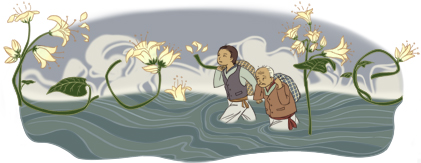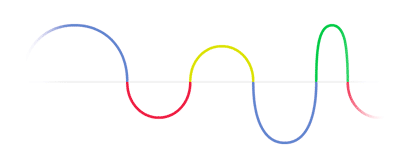Doodle: Marcela Paz's 110th Birthday
Marcela Paz (February 28, 1902-June 12, 1985) was the pen name of Esther Huneeus Salas de Claro, a Chilean writer. She also used the pen names of Paula de la Sierra, Lukim Retse, P. Neka and Juanita Godoy.
Paz was born in Santiago, Chile, the second child from a wealthy family. She studied at home. In 1929 she traveled to Paris for some months and took lessons in visual arts. Back in Chile, she started her literary work. She began publishing in magazines such as El Peneca, Ecran, Zig-Zag, Eva and Margarita, and newspapers like La Nación, El Mercurio and La Tercera. In 1933 she published her first book, Tiempo, papel y lápiz. That same year she married José Luis Claro.
In 1947 Paz published the first book with her most famous character, Papelucho. Papelucho became a companion and an inspiration to generations of children and perhaps one of Chile's most well known humanized characters of the twentieth century. Between 1964 and 1967, she directed the Asociación Internacional del Libro Juvenil, the Chilean chapter of the International Board on Books for Young People (IBBY).
In 1968 she received a Hans Christian Andersen honour diploma. In 1979 she received the gold medal from the Instituto Cultural de Providencia. In 1982, she was awarded with the Premio Nacional de Literatura de Chile.
Ester Huneeus Salas de Claro, más conocida por su seudónimo Marcela Paz (Santiago, 28 de febrero de 1902 — Santiago, 12 de junio de 1985),[1] fue una escritora chilena. Es famosa por su serie de cuentos infantiles Papelucho.
Source : Wikipedia
Doodle: Gioachino Antonio Rossini 220th Bday 29 Feb 2012 Lear year
Gioachino Antonio Rossini(Italian pronunciation: [dʒoaˈkiːno anˈtɔːnjo rosˈsiːni] (Giovacchino Antonio Rossini in the baptismal certificate)(29 February 1792 – 13 November 1868) was an Italian composer who wrote 39 operas as well as sacred music, chamber music, songs, and some instrumental and piano pieces. His best-known operas include the Italian comedies Il barbiere di Siviglia (The Barber of Seville) and La Cenerentola and the French-language epics Moïse et Pharaon and Guillaume Tell (William Tell). A tendency for inspired, song-like melodies is evident throughout his scores, which led to the nickname "The Italian Mozart." Until his retirement in 1829, Rossini had been the most popular opera composer in history.
Doodle: Heinrich Rudolf Hertz's 155th Birthday
Heinrich Rudolf Hertz (February 22, 1857 – January 1, 1894) was a German physicist who clarified and expanded the electromagnetic theory of light that had been put forth by Maxwell. He was the first to conclusively prove[1] the existence of electromagnetic waves by engineering instruments to transmit and receive radio pulses using experimental procedures that ruled out all other known wireless phenomena.
Doodle: Ito Jakuchu's 296th Birthday
Itō Jakuchū (1716-1800) was an Eccentric Japanese painter of the mid-Edo period when Japan had closed its doors to the outside world. Many of his paintings concern traditionally Japanese subjects, particularly chickens and other birds. Many of his otherwise traditional works display a great degree of experimentation with perspective, and with other very modern stylistic elements.
Though compared to Soga Shōhaku and other exemplars of the mid-Edo period eccentric painters, Jakuchū is said to have been very calm, restrained, and professional. He held strong ties to Zen Buddhist ideals, and was considered a lay brother (koji); but he was also keenly aware of his role within a Kyoto society that was becoming increasingly commercial.
Doodle: Birthday Charles Dickens 7 February 2012
Charles John Huffam Dickens (play /ˈtʃɑːlz ˈdɪkɪnz/; 7 February 1812 – 9 June 1870) was an English novelist, generally considered the greatest of the Victorian period. Dickens enjoyed a wider popularity and fame than had any previous author during his lifetime, and he remains popular, having been responsible for some of English literature's most iconic novels and characters.
Many of his writings were originally published serially, in monthly instalments, a format of publication which Dickens himself helped popularise. Unlike other authors who completed novels before serialisation, Dickens often created the episodes as they were being serialised. The practice lent his stories a particular rhythm, punctuated by cliffhangers to keep the public looking forward to the next instalment.The continuing popularity of his novels and short stories is such that they have never gone out of print.
Dickens's work has been highly praised for its realism, comedy, mastery of prose, unique personalities and concern for social reform by writers such as Leo Tolstoy, George Orwell and G. K. Chesterton; though others, such as Henry James and Virginia Woolf, have criticised it for sentimentality and implausibility.
Subscribe to:
Comments (Atom)













